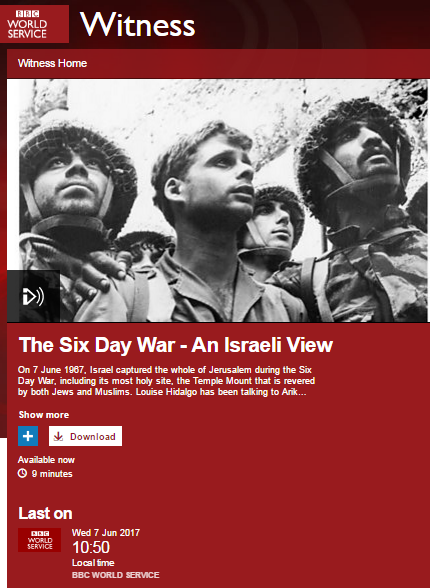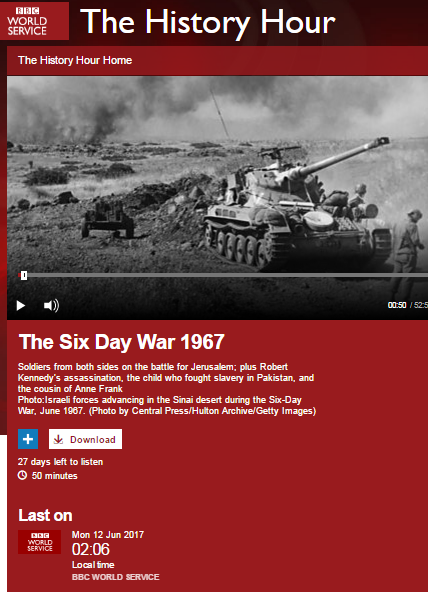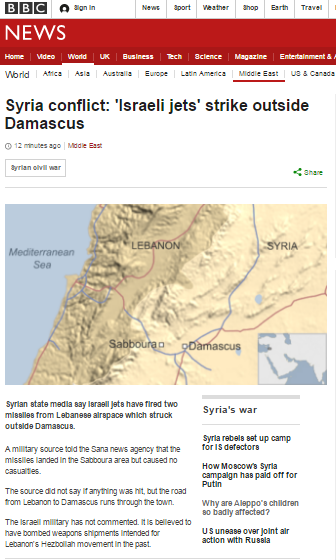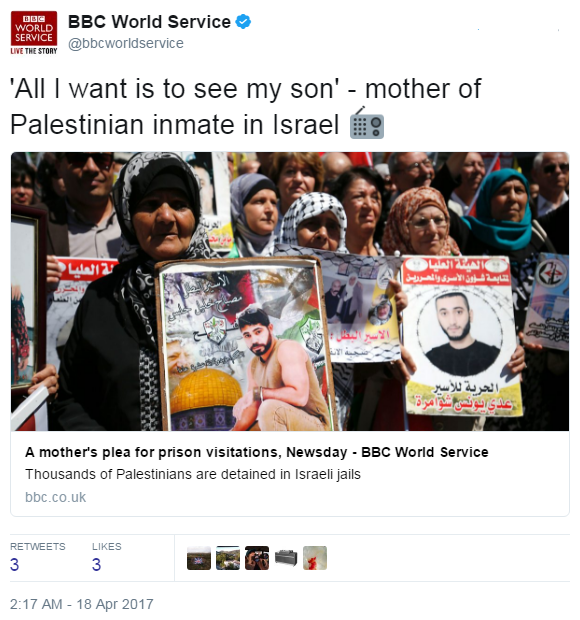The edition of the BBC World Service radio history programme ‘Witness‘ that was broadcast on June 7th 2017 (and repeated in the same station’s programme ‘The History Hour’ on June 12th) is titled “The Six Day War – An Israeli View” and is described as follows in its synopsis:
“On 7 June 1967, Israel captured the whole of Jerusalem during the Six Day War, including its most holy site, the Temple Mount that is revered by both Jews and Muslims. Louise Hidalgo has been talking to Arik Achmon, one of the first Israeli paratroopers to enter the old city that day and reach the Western Wall.”
In among her conversation with Arik Achmon, presenter Louise Hidalgo provided listeners with background to the story, some of which – to the programme’s credit – BBC audiences rarely hear. However, other parts of that background information were incomplete and unhelpful.
Hidalgo opened the programme thus: [emphasis in italics in the original, emphasis in bold added]
“Today we go back to the Six Day War between Israel and its Arab neighbours: a war that reshaped the Middle East. During those six days, Jordan, Egypt and Syria lost control of the West Bank, the Gaza Strip and the Golan Heights. But perhaps the Israelis’ most symbolic victory came in Jerusalem: the city revered equally by Jews, Muslims and Christians. “
While one can question the use of the word ‘equally’ in that portrayal, Hidalgo’s subsequent presentation of the significance of Temple Mount was accurate.
“The old walled city contains one of the world’s most holy sites, the Temple Mount. Haram al Sharif in Arabic, Har Habayit in Hebrew.”
“…this [the Old City of Jerusalem] was home to this hugely revered site the Temple Mount; the Jews’ holiest site – the site of the first and second temples – and the Western Wall where, until then, Jews hadn’t been able to pray. And also so important to Muslims: the third holiest site after Mecca and Medina.”
Hidalgo’s presentation of the causes of the Six Day War included an important – yet rare – reference to the underlying Arab refusal to accept the existence of the Jewish state.
“By 1967 Israel had existed for almost 20 years but its Arab neighbours refused to accept it. The rhetoric was becoming more and more bellicose.”
While the Egyptian-Jordanian defence pact was mentioned by Hidalgo and Arik Achmon spoke of the build-up of Egyptian forces in Sinai, no mention was made of Nasser’s expulsion of UN forces from Sinai or of the casus belli – Egypt’s closure of the Straits of Tiran. Also absent from Hidalgo’s portrayal was Levi Eshkol’s appeal to Jordan not to join the hostilities which, had it not been rejected, would have meant that Jerusalem would not have been included in the fighting.
“On the 30th of May President [sic] Hussein of Jordan and the Egyptian leader Gamal Abdel Nasser signed a defence agreement.”
“Early on Monday the 5th of June Israeli jets attacked the Egyptian airforce.”
Commendably, Hidalgo made a rare reference to Israel’s actions after the war ended:
“Those six days gave Israel not just control of the whole of Jerusalem and the Temple Mount for the first time, they also gave it control of territory many times larger than its own size. After the war the Israelis gave administrative control of the Temple Mount to the Jordanian Islamic Trust – or Waqf. Years later they’d also give back Sinai to the Egyptians.”
However, presentation of the relevant background information concerning the 1948 Jordanian invasion of territories designated as part of the homeland for the Jewish people at the San Remo conference in 1920 and the subsequent 19 year-long Jordanian occupation of parts of Jerusalem was – as is usually the case in BBC content – decidedly evasive and unhelpful to audiences.
“Since the formation of the State of Israel in 1948 it [the Old City of Jerusalem] had been controlled by Jordan but on Wednesday the 7th of June 1967, Israel captured it.”
“This city line since 1948 had divided Jordanian controlled East Jerusalem – which included the Old City with its maze of narrow alleyways and its holiest site Temple Mount – from the west of Jerusalem which the Israelis controlled.”
“No Israeli soldier had set foot in the Old City, had they? Israel had lost its only foothold there, the Jewish Quarter, in the 1948 war…”
The following day’s edition of ‘Witness’ – which also told the story of the fighting in Jerusalem during the Six Day War but from the point of view of a Jordanian soldier – will be discussed in part two of this post.
Related Articles:
BBC WS ‘The History Hour’ breaches impartiality guidelines with Palestinian activist
BBC WS radio’s ‘balanced’ account of the Six Day War excludes Israelis




